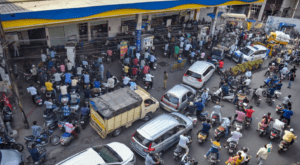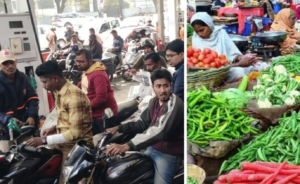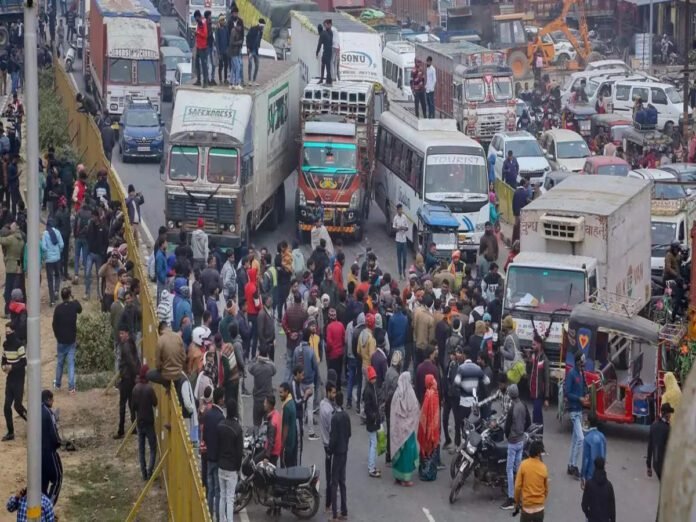Day 2 of national truckers’ strike: Protesters block roads across states; restrict fuel sales at local stations in Chandigarh when pumps run out of fuel.
2 min read 2024-01-02, 10:00 PM IST
Summary of the content
- Nationwide Transportation Strike: Truck, bus, and tanker drivers in India initiate a three-day strike protesting against stringent jail and fine regulations for hit-and-run cases under the newly-launched Bharatiya Nyay Sanhita (BNS).
- Protests Across States: Protests erupt in various states, including Gujarat, Rajasthan, Maharashtra, and Madhya Pradesh, leading to road blockades, disruptions, and concerns over fuel shortages.
- Fuel Supply Disruptions: The strike impacts fuel supply, prompting the Maharashtra government to request police intervention for uninterrupted petrol and diesel supply. Chandigarh imposes temporary restrictions on fuel sales due to limited supply.
- Challenges for Commuters: Commuters in Madhya Pradesh face inconvenience due to ongoing strikes, with a video circulating on social media showing frustration over the lack of available buses or taxis for travel.
- Law Replacing Indian Penal Code: The new law replaces the colonial-era Indian Penal Code, introducing severe penalties for hit-and-run accidents, causing widespread dissatisfaction among drivers and transport associations.
- Road Blockades and ‘Rasta Roko’ Protests: Protests escalate with road blockades, ‘rasta roko’ demonstrations, and setting up of blockades in various districts, leading to significant disruptions.
- Petrol Pump Rush: Lengthy queues form at petrol pumps in multiple cities, including Himachal Pradesh’s Shimla and Dharamshala, Mumbai, and Thane in Maharashtra, as drivers rush to fill their tanks amid fears of fuel shortages.
- Government Response: State governments take measures to address challenges, with the Food and Civil Supply Department urging police for a smooth fuel supply in Maharashtra, and the Moga deputy commissioner in Punjab reassuring the public about fuel availability.
- Transporters’ Demands: C L Mukati, chairman of the transport committee of All India Motor Transport Congress (AIMTC), advocates for improvements in road and transportation systems before introducing stringent provisions in hit-and-run cases.
- Complex Situation: The ongoing dialogue between authorities and transporters is crucial for resolving issues and ensuring the smooth functioning of transportation systems in the country amid the nationwide strike.

Nationwide Transportation Strike and Protests Against Stringent Hit-and-Run Law
The second day of a nationwide transportation strike in India has been marked by widespread protests against a provision in the newly introduced penal law concerning hit-and-run road accidents. Truck, bus, and tanker drivers have embarked on a three-day strike to voice their opposition to the stringent jail and fine regulations outlined in the recently launched Bharatiya Nyay Sanhita (BNS) for hit-and-run cases. This development has led to a cascade of challenges, including disruptions in fuel supply, road blockades, and protests across multiple states.
Strike Impact on Fuel Supply
As the transportation strike entered its second day, vehicles queued outside petrol pumps, signaling the impact on fuel supply in cities nationwide. The agitation has caused concerns about fuel shortages, prompting the Maharashtra state government to request police intervention to ensure an uninterrupted supply of petrol and diesel. The situation has led to inconvenience for commuters in states like Madhya Pradesh, reflecting the broader implications of the ongoing strikes.
Chandigarh Implements Fuel Restrictions
In Chandigarh, a district magistrate responded to the limited supply of petrol and diesel caused by the ongoing strike by fuel-tanker drivers. Temporary restrictions on fuel sales at local stations were imposed, effective immediately. Two-wheelers can now obtain only 2 liters, and four-wheelers are restricted to 5 liters per transaction. These measures aim to manage the available fuel resources amid the strike-related disruptions.
Protests and Road Blockades
Protestors have taken to the streets, blocking roads and highways in states such as Gujarat, Rajasthan, Maharashtra, and Madhya Pradesh. Concerned locals rushed to petrol pumps, fearing potential disruptions in fuel supply due to the ongoing agitation. The protests have been marked by the parking of trucks on highways, ‘rasta roko‘ demonstrations, and the setting up of blockades, causing significant disruptions in several districts.
Impact on Commuters and Essential Services
The newly implemented law, replacing the colonial-era Indian Penal Code, introduces severe penalties for drivers involved in hit-and-run accidents. Commuters have expressed frustration over the lack of available buses or taxis, with a video circulating on social media capturing the challenges faced by those trying to travel from Bhopal to Indore. The strike has also affected the operation of roadway buses in Rajasthan, causing temporary disruptions but resuming after police intervention.
Petrol Pump Rush and Fuel Shortages
In various cities, lengthy queues formed at petrol pumps as drivers associated with the Transport Association protested against the new hit-and-run law. In Himachal Pradesh’s Shimla and Dharamshala, drivers protested, contributing to the rush at petrol stations. Mumbai and Thane in Maharashtra witnessed heavy queues outside petrol pumps as people sought to fill their tanks amid fears of fuel shortages. The Petrol Dealers Association in Mumbai reported that fuel supply to pumps was affected due to the drivers’ agitation.

Response from Authorities
The state governments have taken steps to address the challenges posed by the strike. In Maharashtra, the Food and Civil Supply Department urged the police to ensure a smooth and uninterrupted supply of petrol, diesel, kerosene, and LPG cylinders. Moga deputy commissioner Kulwant Singh in Punjab reassured the public about fuel supply, emphasizing that the administration was closely monitoring the situation and would ensure an uninterrupted supply of fuel.
Transporters’ Perspective and Demands
C L Mukati, chairman of the transport committee of All India Motor Transport Congress (AIMTC), emphasized the need for prioritizing improvements in road and transportation systems before introducing stringent provisions in hit-and-run accident cases. He argued that the government should learn from foreign nations’ practices in road safety and transportation infrastructure.
Conclusion
The nationwide transportation strike and protests against the stringent hit-and-run law in India have created a complex and challenging situation. As the government faces demands for amendments to the newly introduced law, the impact on commuters, essential services, and fuel supply underscores the far-reaching consequences of such strikes. The ongoing dialogue between authorities and transporters will play a crucial role in resolving the issues and ensuring the smooth functioning of transportation systems in the country.

